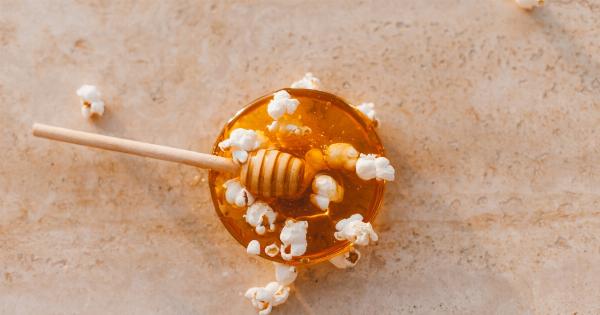Popcorn is a beloved snack that is enjoyed by people all over the world. Whether it’s at the movie theater, during a Netflix binge, or at a sports event, popcorn is a must-have treat.
However, there are often concerns about the health effects of eating popcorn, particularly when it comes to calories and nutrition. In this article, we will explore the truth about popcorn and its impact on our health.
1. What is Popcorn?
Popcorn is a type of corn kernel that expands and puffs up when heated. It is typically consumed as a snack and can be enjoyed in various flavors, such as butter, salted, caramel, or cheese.
Popcorn is unique because of its ability to pop due to the presence of moisture inside the kernel. When heated, the moisture turns into steam, building pressure until the kernel explodes and gives rise to the fluffy popcorn we know and love.
2. Popcorn and Calories
Calories are a measure of the energy that food provides to our bodies. When it comes to popcorn, the number of calories can vary depending on how it is prepared. Plain, air-popped popcorn is relatively low in calories.
One cup of air-popped popcorn contains about 31 calories. However, when additional ingredients like oil, butter, or sugar are added during the preparation process, the calorie count increases. A cup of oil-popped popcorn can contain around 55-60 calories.
3. Popcorn and Nutritional Value
While popcorn may be low in calories, it is not devoid of nutritional value. Popcorn is a whole grain, which means it contains all parts of the grain, including the bran, germ, and endosperm.
Whole grains provide important nutrients, such as dietary fiber, B vitamins, and minerals. One serving of popcorn can provide up to 4 grams of fiber, which is beneficial for digestion and can help promote feelings of fullness.
4. Fiber Content of Popcorn
Fiber is a crucial component of our diet that offers numerous health benefits. Popcorn contains both soluble and insoluble fiber, which play different roles in our body.
Soluble fiber helps to lower cholesterol levels and stabilize blood sugar, while insoluble fiber promotes regular bowel movements and prevents constipation. Including popcorn in your diet can be an easy and tasty way to increase your fiber intake.
5. Antioxidants in Popcorn
Antioxidants are compounds that protect our cells from damage caused by free radicals, unstable molecules that can lead to chronic diseases. Popcorn contains a variety of antioxidants, including polyphenols and ferulic acid.
These antioxidants help reduce inflammation and protect against oxidative stress. While the levels of antioxidants may vary depending on factors like popcorn variety and preparation methods, indulging in popcorn can contribute to your overall antioxidant intake.
6. Popcorn as a Snack
When it comes to snacking, popcorn can be a healthier option compared to many other snacks. It is a low-calorie, whole grain snack that can satisfy hunger and provide essential nutrients.
However, it is important to be mindful of the way popcorn is prepared and flavored. Air-popped popcorn without added salt or butter is the healthiest choice. If you prefer flavored popcorn, opt for ones with natural seasonings or make your own healthier versions at home.
7. Moderation and Portion Control
While popcorn can be a part of a healthy diet, it is essential to practice moderation and portion control.
Despite being low in calories, excessive consumption of popcorn can lead to weight gain, especially when prepared with high-calorie toppings or consumed in large quantities. Stick to recommended serving sizes and enjoy it as a snack alongside a balanced diet consisting of fruits, vegetables, lean proteins, and whole grains.
8. Choosing Healthier Popcorn Options
When purchasing popcorn, look for brands that use minimal additives, preservatives, and artificial flavors. Opt for plain or lightly flavored popcorn instead of those high in sodium, sugar, or unhealthy fats.
Popcorn made with olive oil or coconut oil can be a healthier choice compared to those made with hydrogenated oils. Reading the nutrition label and ingredient list can help you make informed choices about the quality and nutritional value of the popcorn you buy.
9. Popcorn and Allergies
While popcorn itself is gluten-free and nut-free, it is crucial to be cautious about potential allergens when consuming popcorn.
Some pre-packaged popcorn products may contain gluten, nuts, dairy, or other allergenic ingredients due to added seasonings or flavors. Always read the labels carefully if you have any specific food allergies or dietary restrictions to ensure safe consumption.
10. Conclusion
Popcorn, in its natural state, can be a healthy and nutritious snack. Its low-calorie content, high fiber content, and antioxidant properties make it a good choice for those seeking a satisfying snack.
However, moderation and portion control should always be practiced, while being mindful of the ingredients and additives used during popcorn preparation. By selecting healthier popcorn options and enjoying it as part of a balanced diet, you can continue to delight in this delicious and popular snack.





























